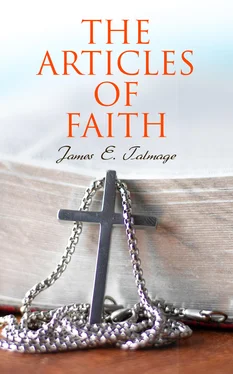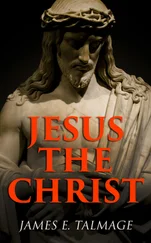8. Man's Responsibilityfor his individual acts is as complete as is his agency to elect for himself. The natural result of good deeds is happiness; the consequence of evil is misery; these follow in every man's life by inviolable laws. There is a plan of judgment128 divinely fore-ordained, by which every man will be called to answer for his deeds; and not for deeds alone but for his words also, and even for the thoughts of his heart. "But I say unto you, that every idle word that men shall speak, they shall give account thereof in the day of judgment."129 These are the words of the Savior Himself. "And let none of you imagine evil in your hearts against his neighbor, and love no false oath: for all these are things that I hate, saith the Lord."130 John the Revelator was permitted to learn in vision something of the scenes connected with the last judgment; he says: "And I saw the dead, small and great, stand before God; and the books were opened: and another book was opened, which is the book of life; and the dead were judged out of those things which were written in the books, according to their works. And the sea gave up the dead which were in it; and death and hell delivered up the dead which were in them: and they were judged every man according to their works."131
9.The judgment of God is not always made to follow immediately the acts of men; good deeds may not be at once rewarded, evil is rarely peremptorily punished; and this is according to Divine wisdom; were it appointed otherwise, the test of individual nature, and the trial of human faith, for which purposes this mortal probation was primarily ordained, would be greatly lessened; for the certainty of immediate pleasure or pain would almost universally determine human acts to secure the one and to avoid the other. Judgment, therefore, is postponed, that every one may fully prove his nature, the good man increasing in righteousness, and the evil doer possessing opportunity of repentance and reparation before the great and terrible day. On rare occasions, speedy judgment of a temporal nature has been executed, the physical results of worldly blessing for good,132 and calamity for evil deeds133a following swiftly upon the acts. Whether such retribution entirely satisfies the claims of justice, or a further visitation of judgment is to take place beyond this world, matters not. Such acts are exceptional in the Divine administration.
10.It is the prerogative of Jesus Christ133b to judge the children of men, and He will do it as His own purposes, which are likewise the purposes of His Father, may be best served. John records the words of Christ: "For the Father judgeth no man, but hath committed all judgment unto the Son; that all men should honor the Son even as they honor the Father."134 And Peter, while expounding the gospel to the devout Gentile, Cornelius, declared concerning Jesus Christ, that "it is He which was ordained of God to be the Judge of quick and dead."135 Of the dread fate of the wicked reserved for the judgment day, many prophets have borne record136 and the presiding Judge of that awful tribunal has given in His own words descriptions137 so vivid and forceful, as to leave no shadow of doubt that every living soul will be called to acknowledge the record, and to accept the results of his acts. The Lord's words and those of His prophets are unequivocal, that He is no respecter of persons,138 and that any species of favor foreign to justice is unknown to Him. This judgment none but the unrepentant wicked need fear; to the righteous it is a time of triumph.139
11. Sin.—What is the nature of sin? To this question the Apostle John replies, "Sin is the transgression of the law."140 In the original language of the Bible records, many words occur for which our single term sin is used, all however conveying the common idea of opposition to the Divine will.141 As God is the embodiment of purity and perfection, such opposition is a rebellion against the principles of advancement, and an acceptance of the practices that lead to degradation. Sin is any condition, whether consisting in omission of things required, or in commission of acts forbidden, which tends to prevent or hinder the development of the human soul. As a righteous course leads to eternal life, so sin tends toward the darkness of the second death. Sin was introduced to the world by the arch-fiend Satan;142 yet it is by Divine permission that mankind is brought in contact with sin, the contrast between evil and good thus being learned.
12.According to the technical definition of sin, it consists in the violation of law, and in this strict sense sin may be committed inadvertently or in ignorance. It is plain, however, from the scriptural doctrine of human responsibility, and the unerring justice of God, that in his transgressions as in his righteous deeds, man will be judged according to his ability to comprehend law. To him who has never been made acquainted with a higher law, the requirements of that law do not apply in their fulness. For sins committed without knowledge—that is, for laws violated in ignorance, a propitiation has been provided in the atonement wrought through the sacrifice of the Savior; and sinners of this class do not stand condemned.
13.Nephi, prophesying to the ancient inhabitants of the western continent, taught them this doctrine:—"Where there is no law given, there is no punishment; and where there is no punishment, there is no condemnation; and where there is no condemnation, the mercies of the Holy One of Israel have claim upon them, because of the atonement; for they are delivered by the power of him; For the atonement satisfieth the demands of his justice upon all those who have not the law given to them, that they are delivered from that awful monster, death and hell and the devil, and the lake of fire and brimstone which is endless torment; and they are restored to that God who gave them breath, which is the Holy One of Israel."143 And then, in contrast with the lot of those who are thus pardonable, the prophet adds:—"But wo unto him that has the law given; yea, that has all the commandments of God, like unto us, and that transgresseth them, and that wasteth the days of his probation, for awful is his state!"144 This is in strict agreement with the teachings of Paul to the Romans, "For as many as have sinned without law shall also perish without law; and as many as have sinned in the law shall be judged by the law."145 And the word of modern scripture is to the same effect, for we are told through recent revelation to the Church, that among those who are to receive the blessings of redemption are "they who died without law."146 These will include the heathen nations, whose redemption is promised, with the added declaration that "they that knew no law shall have part in the first resurrection."147
14. Punishment for Sin.—As rewards for righteous deeds are proportionate to deserving acts, so the punishment prescribed for sin is made adequate to the offence.148 Punishment is inflicted upon the sinner, for disciplinary and reformatory purposes, and in support of justice. There is nothing of vindictiveness or of desire to cause suffering in the Divine nature; on the contrary, our Father is cognizant of every pang, and permits such to afflict for beneficent purposes only. God's mercy is declared in the retributive pains which He allows, as in the blessings of peace which issue from His hand. It is scarcely profitable to speculate as to the exact nature of the spiritual suffering imposed as punishment for sin. Comparison with physical pain,149 such as the tortures of fire, in a sulphurous lake, serve to show that the human mind is incapable of comprehending the depth of these dread penalties. The sufferings entailed by the awful fate of condemnation are more to be feared than are any possible inflictions of purely physical torture; the mind, the spirit, the whole soul is doomed to suffer, and the extent of the torment no man knoweth.
Читать дальше












